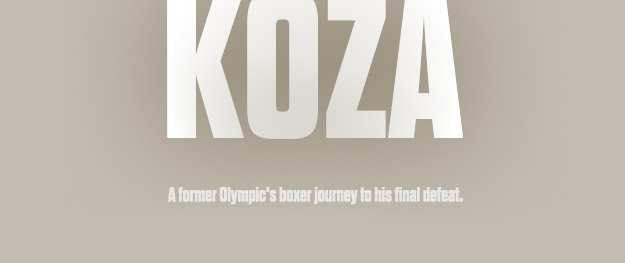Synopsis
Peter "Koza" Baláž is a former Olympic boxer. He and his girlfriend Miša live in a dilapidated housing estate, constantly struggling to make ends meet. Miša learns that she is expecting a baby. She decides to terminate her pregnancy and she wants Koza to find the necessary money. Koza, who has not trained in a while, steps back into the ring, hoping to earn some much-needed cash and possibly change Miša's mind. He and his manager, Zvonko, embark on a "tour" through uncountable fights, where success seems impossible and yet is never forfeited. How many blows must Koza take, in order to earn a decent family live? Koza features Peter Baláž, who competed at the 1996 Olympic Games in Atlanta, and Ján Franek, Olympic medallist from Moscow 1980, as his coach. Featuring the outstanding performances of non-professional actors and blurring the lines between representation and presence, Koza is a powerful and haunting challenge to the concept of authenticity.
DIRECTOR'S STATEMENT
Koza is a simple guy from a special school for kids with learning disabilities and disorders, but what I really respect about him is that considering the situation he grew up in, he worked his way up. His parents left him with his grandmother and since Koza's father was a boxer, too, Koza wanted to impress his dad and started boxing because of him, hoping the parents would take him back. Koza is a nice person, but he's somehow struggling to get control of his life.
I knew that hiring him to do the film would also make his life a bit easier – he would get paid and would get some extra cash beside his low disability pension. He was glad to have this opportunity and he hoped his life would change.
Of course, nobody can change your life for you. You only can do it on your own. But what helped Koza is that for four years, during the time we were preparing and shooting the film, he was in contact with a different reality, which, of course, influenced him, changed his perception of life, moved him into a different direction.
Koza's story is tough and sad, it deals with several pressing and complicated issues, but that was not the storyline we wanted to emphasize. On the contrary, we even wanted to repress it to avoid the pathos which usually emerges when one stresses pain, misery and misfortune.
To express the “step-back” formally, as well, with cinematographer Martin Kollár we decided to shoot the film with a static camera and in long shots. That gives the audience a bit of a psychological distance and emotional freedom in the film.
